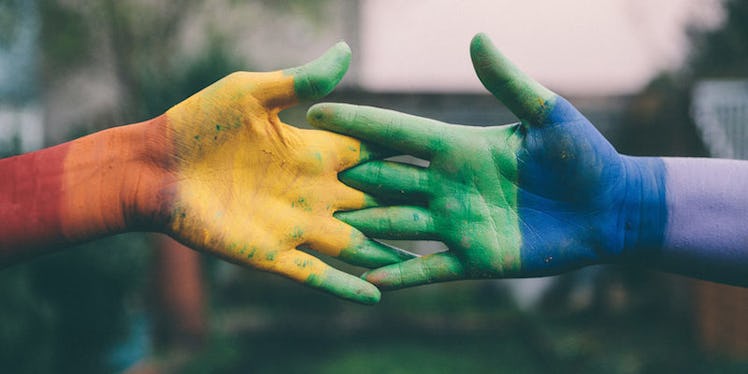I don’t need you to walk on eggshells around me.
I’ve misgendered another trans person by mistake. I’ve even called myself the wrong name.
Humanity is not designed to think and execute thoughts flawlessly.
But many people label themselves trans allies just because they are okay with the idea of transgender people.
But “I don’t mind” doesn’t make you an advocate. It makes you apathetic.
I’m not asking you to attend a rally or send a letter to your local government (though by all means, please do if you’re so inclined) to show you are truly committed to bearing the "ally" label.
When it comes to being an ally, it’s the little things that count:
1. Avoid pronoun usage.
Think you’re being subtle? It’s incredibly obvious.
Some people avoid using pronouns because they’re afraid they will accidentally use the wrong ones.
Just make an honest attempt at it.
If you mess up and realize it, just immediately correct yourself. Saying the wrong pronoun and letting it slide because you’ll “get it next time” is absolutely not the right thing to do.
Trust me, I’m worth dropping or adding an extra letter or two.
2. Don't stay silent when other people misgender us.
If our close friends and families skim over someone else misgendering us, it hurts just as much as the misgendering itself.
If you see someone else stumble over a pronoun, you don’t need to spread your arms wide and cry foul.
That kind of exhibitionism is overwhelming and humiliating to the very person you are trying to defend.
Should you feel it appropriate, take the friends who were misgendered aside and ask if they are okay, or if they would like you to correct the person for them.
You know what’s also great?
When you introduce a trans person and manage to sneak his or her pronouns in. It’s not a great idea to directly say, “They go by x pronoun.”
That’s essentially outing the person as trans because for cis people, the norm is to have assumed pronouns.
But you might say, “This is Nate. He’s in my English class.”
A lot of people subconsciously pick up on the pronoun you use and use it automatically. This is better than having them guess based on the person’s presentation.
3. Don't overdo it.
Trans allies are very mindful of being inclusive, but this can be overdone.
If you overemphasize the masculine or feminine traits of someone (i.e. calling a trans woman “hey girlfriend” a million times) you are treating him or her in a way that is different from the way you would treat another cisgender (not transgender) person.
For cisgender people, gender is assumed.
Nobody feels the need to emphasize it in one way or another to reinforce that identity.
So, when you do that to people who are trans, you are throwing their trans identity in their face.
4. Don't call us "brave."
As much as it may seem like it, this is not a compliment.
A person might claim I’m brave because I’m going against societal norms, but this has the secondary implication I’ll never really be properly integrated into society as a trans person.
It also bears the implication I chose to be trans because bravery requires a difficult choice to be made. There is a choice in whether or not to transition, but the fact is, being transgender is not a choice.
This choice was the path of least resistance for me (though that doesn’t mean it was easy at all), so I certainly don’t feel brave about it.
5. Don’t tell me how good I look.
First off, I know. Second, there is always a silently implied statement after, which is, “for a trans person.”
This doesn’t mean you can never compliment me, but there’s a difference between a genuine compliment and one that comes from a place of comparison to cis people.
Sometimes, it’s as simple as the inflection.
Someone who I considered a friend and an ally to the LGBTQ+ community saw me in person 10 months after I started transitioning.
One of the first things this person said to me was, “Well, at least you’re hot now.” This implied I was an ugly girl.
Trust me, I know I was. I was miserable and I hated being a girl.
You don’t have to point out how undesirable I looked for most of my life.
There is a prevailing attitude of advocacy and allyship among the younger generation today, which is a fantastic thing.
But that desire to support the trans community -- as well as the larger LGBTQ+ community -- must come from an educated place.
I tend to think change starts at a linguistic level.
If we change the way we talk about the issues, we can start to change the issues themselves.
As a writer and transgender man, I know all too well the power of language.
